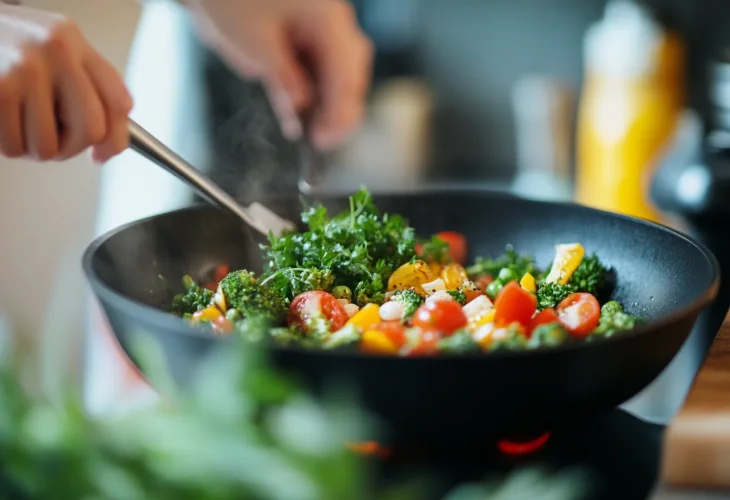Health and Nutrition
Common Cooking Mistakes That Can Ruin Your Meals
From Overusing Oil to Poor Storage Habits- Simple Fixes Every Home Cook Should Know for Better Taste and Nutrition

Cooking, chopping, frying, and striving for the perfect dish are part of everyday life in the kitchen. If your dishes aren’t turning out quite the way you imagined, you might be falling into some of these common traps.
1. Storing Fruits and Vegetables Incorrectly
Keeping produce fresh sounds simple, but poor storage is a common issue. For example, potatoes and onions should never be stored together- the gas released by onions can cause potatoes to spoil faster.
Tomatoes, on the other hand, lose flavor and texture in the fridge. Store them in a cool (but not cold) place. For leafy greens like lettuce or cilantro, a great hack is to store them upright in a sealed jar of water. Small changes to storage habits can improve freshness and reduce waste.
2. Using Too Much Oil
Oil adds flavor, but too much of it can make food greasy and calorie-heavy. Instead of crispy and golden, your dish might end up soggy. Use oil in moderation and choose the right type for your cooking method.
3. Overheating Oils
Different oils have different smoke points. Heating oil beyond its smoke point can produce harmful compounds. For example, unrefined olive oil is great for medium heat cooking but not for deep frying. For high-heat cooking, use oils like refined canola or avocado oil.
4. Too Much or Too Little Salt
Salt enhances flavor and affects texture, but the wrong amount can ruin a dish. Add it gradually and taste as you go. For better control, consider adding salt closer to the end of the cooking process when appropriate.
5. Overcooking or Undercooking
Overcooked pasta turns mushy. Overcooked chicken gets dry. Food continues cooking even after the heat is turned off, so timing matters. Use a timer and follow recommended cooking times especially for complex recipes. For pasta, turn off the heat just before it's done- it will finish cooking in the hot water.
6. Overusing Kitchen Gadgets
Modern kitchens are stocked with blenders, mixers, and slicers. While convenient, they can sometimes compromise taste and texture. For instance, using a blender to chop salad ingredients may create a mushy mess. Hand-cutting keeps things fresh and pleasant to eat.
7. Pre-Cutting the Wrong Ingredients
Prepping ahead saves time, but some foods, like apples, avocados, and potatoes, oxidize and turn brown when exposed to air. This can affect both taste and nutrition. If you must cut them ahead, store them in water with a bit of lemon juice to slow down browning.
8. Adding Spices Too Late
Adding spices only at the end means your dish won’t absorb their full flavor. Spices should often be added early, especially in slow-cooked or sautéed dishes, to allow the flavors to blend and deepen.
9. Overcooking Vegetables
Too much cooking ruins texture and destroys vitamins. Instead, try shorter cooking times or methods like steaming, which preserves more nutrients compared to boiling.
10. Overcrowding the Pan
Too much food in the pan at once prevents proper searing and leads to steaming. Cook in smaller batches or use a larger pan to ensure even heat and the perfect texture.
11. Cutting Meat or Vegetables the Wrong Way
For meat, always slice against the grain to keep it tender. With veggies like carrots or potatoes, uniform cuts ensure even cooking and prevent raw spots.
12. Not Salting Pasta Water Properly
Pasta needs salty water to absorb flavor. If the water isn’t salted enough, even the best sauce won’t save it from being bland.
13. Freezing Food Incorrectly
Freezing food without proper wrapping leads to freezer burn and loss of flavor. Always store food in airtight containers or well-wrapped to preserve taste and texture.
14. Using Table Salt Instead of Coarse Salt
Fine salt dissolves too quickly in hot dishes and can easily make them overly salty. Coarse salt dissolves more slowly and offers better control over seasoning.
Cooking is an art- but it’s also a science. Avoiding these small but common mistakes can shift your dishes from “just okay” to genuinely delicious. Sometimes, all it takes is a better storage habit, smarter timing, or a gentler hand with the seasoning to transform your home-cooked meals.

